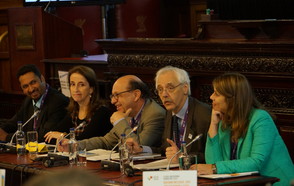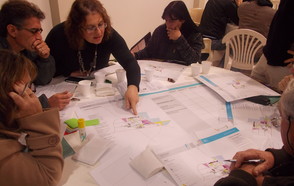
China is facing a fast and significant urbanization process, which makes up a major component of the country’s GDP. To make this process more sustainable, the Chinese Government sees the need for more flexible urban governance. To turn this intention into a reality at the local level, the Wuhan Land Use and Urban Planning Centre is implementing the Universal Planning Guideline on planning as a pilot project in China. The Centre has requested the support of UN-Habitat, including policy support and project advice on public space and regenerating iconic urban projects. UN-Habitat and the City of Wuhan invited key experts and partners from 5 to 7 of September, 2016 in Wuhan to discuss this groundbreaking process in China.
Wuhan is a port city located along the Yangtse yellow with 8 million inhabitants. It covers and includes population of a vast hinterland. The economy is historically based on steel and trade, although today the real estate industry has surpassed all other sectors. The city is a member of UCLG ASPAC and Metropolis and has a particular interest in planning, education and culture, as it hosts one of the largest universities in China with more than 1 million students.
UCLG has been very active in the development of the planning guidelines, and was invited to support the process of localizing the guidelines in Wuhan. The implementation of the guidelines in China is relevant to the Chinese decentralization process. As a key input for the implementation process, the Wuhan Centre had undergone a self-assessment on planning and land decisions that revealed some challenges:
1. Differences in guideline ideologies, as permits and control were not really linked to planning and strategies.
2. Unequal planning systems making a coherent standardization difficult.
3. Inefficient management system, as land use planning reflects centralized decisions and inefficiency.
4. Disunity among technologies. Information platforms have different statistical caliber which are not easy to consult and take into consideration for decisions.
UCLG feedback was welcomed, and evidence gathered in Wuhan shows the importance of local policies for planning and reveals the role and opportunity of strong local governments for a sustainable urbanization. In this regard, UCLG urges the UN Habitat team to assess and monitor commitment and performance of all actors, including local, regional and national governments, real estate industry, professionals and the civil society.
During the conclusion of the meeting, it became clear that monitoring the urbanization and land use provides evidence that the Chinese system requires more flexibility and tolerance in its public policies. This is important if the public sector wishes to continue to support urbanization but also mitigate speculation and risk of collapse of the real estate industry.
More information: www.uclg-planning.org














